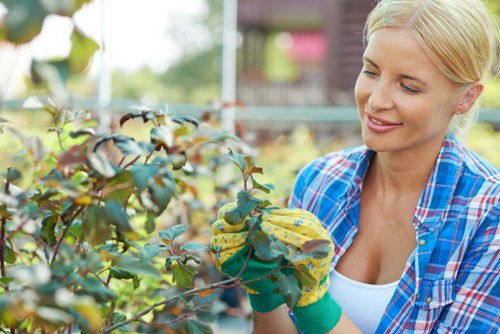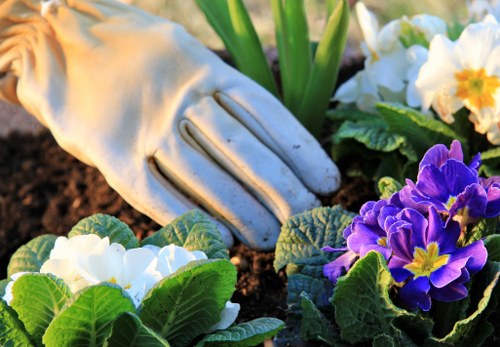Garden Maintenance in Greenwich
Introduction to Garden Maintenance

Maintaining a beautiful garden in Greenwich requires a blend of passion, knowledge, and consistent effort. Whether you're a seasoned gardener or a beginner, understanding the essentials of garden maintenance can transform your outdoor space into a thriving oasis.
Greenwich's unique climate and soil conditions present both opportunities and challenges for gardeners. By tailoring your maintenance practices to the local environment, you can ensure your garden remains lush and vibrant throughout the year.
In this article, we'll explore comprehensive strategies and tips for effective garden upkeep in Greenwich, helping you create and sustain a picturesque landscape that enhances your property's appeal.
Understanding Greenwich's Climate and Soil

The success of your garden largely depends on how well you adapt to Greenwich's specific climatic conditions. Greenwich experiences a temperate maritime climate, characterized by mild winters and cool summers, with ample rainfall distributed throughout the year.
Therefore, selecting the right plants that thrive in such an environment is crucial. Opting for native species or those well-suited to the local climate can reduce maintenance efforts and enhance plant resilience.
Additionally, understanding the soil composition in Greenwich is essential. Most areas boast fertile soil rich in organic matter, but it's advisable to conduct a soil test to determine pH levels and nutrient content. This knowledge allows you to amend the soil appropriately, ensuring optimal growth conditions for your plants.
Essential Garden Maintenance Practices

Effective garden maintenance involves a combination of regular tasks that promote plant health and aesthetic appeal. Here are some key practices to incorporate into your routine:
- Pruning: Regular pruning helps shape plants, encourages healthy growth, and prevents diseases.
- Watering: Consistent watering schedules are vital, especially during dry spells, to ensure plants receive adequate moisture.
- Weeding: Removing unwanted weeds reduces competition for nutrients and minimizes pest habitats.
- Fertilizing: Providing essential nutrients supports plant growth and enhances flowering and fruiting.
- Pest Control: Monitoring for pests and implementing eco-friendly control measures protects your garden from infestations.
Incorporating these practices into your garden maintenance routine will result in a healthier, more attractive garden that requires less intensive care over time.
Seasonal Maintenance Tips

Adapting your garden maintenance to the changing seasons in Greenwich ensures year-round beauty and plant health. Here's a breakdown of essential tasks for each season:
- Spring: Focus on planting new blooms, pruning dead branches, and preparing the soil by adding compost.
- Summer: Maintain consistent watering, mulch to retain moisture, and manage pests effectively.
- Autumn: Clear fallen leaves, plant bulbs for spring, and protect sensitive plants from early frosts.
- Winter: Prune dormant plants, protect delicate species from harsh weather, and plan for the upcoming gardening season.
By following these seasonal guidelines, you can anticipate and address the specific needs of your garden throughout the year.
Choosing the Right Tools and Equipment

Investing in quality gardening tools is fundamental for efficient garden maintenance in Greenwich. Essential tools include:
- Pruning Shears: Ideal for trimming and shaping plants.
- Lawn Mower: Maintains the grass at an optimal height.
- Garden Fork: Facilitates soil aeration and turning.
- Hedges Trimmer: Keeps hedges neat and well-defined.
- Watering Equipment: Ensures plants receive adequate moisture, whether through hoses, sprinklers, or drip irrigation systems.
Having the right tools at your disposal not only makes maintenance tasks easier but also enhances the overall effectiveness of your garden care efforts.
Implementing Sustainable Practices
Adopting sustainable garden maintenance practices benefits both your garden and the environment. Consider the following strategies:
- Composting: Recycling organic waste into compost enriches the soil and reduces landfill debris.
- Rainwater Harvesting: Collecting rainwater for irrigation minimizes reliance on municipal water sources.
- Integrated Pest Management: Combining biological, cultural, and mechanical control methods reduces the need for chemical pesticides.
- Native Plant Selection: Incorporating native species supports local biodiversity and requires less maintenance.
Implementing these sustainable practices fosters a healthy ecosystem in your garden while promoting responsible resource usage.
Lawn Care in Greenwich
A well-maintained lawn is a cornerstone of any beautiful garden. In Greenwich, lawn care involves several key components:
- Mowing: Regular mowing at the recommended height encourages dense grass growth and prevents weed establishment.
- Aeration: Periodic aeration alleviates soil compaction, enhancing root development and nutrient absorption.
- Fertilization: Applying the right fertilizers at appropriate times supports robust lawn growth.
- Weed Control: Proactively managing weeds ensures a healthy and uniform lawn.
Consistent lawn care practices result in a lush, green carpet that enhances the overall appearance of your garden.
Flower Bed Maintenance
Flower beds add vibrant color and visual interest to your garden. Effective maintenance involves:
- Deadheading: Removing spent blooms encourages continuous flowering.
- Mulching: Applying mulch conserves moisture, suppresses weeds, and regulates soil temperature.
- Soil Enrichment: Regularly adding organic matter improves soil structure and fertility.
- Pruning: Trimming overgrown plants maintains shape and promotes healthy growth.
By diligently maintaining your flower beds, you ensure a stunning and sustained display of blossoms throughout the growing season.
Tree and Shrub Care
Trees and shrubs provide structure and shade to your garden. Proper care includes:
- Pruning: Removing dead or diseased branches enhances tree health and appearance.
- Watering: Ensuring adequate hydration, especially during drought periods, supports robust growth.
- Mulching: Protects the root zones and conserves soil moisture.
- Fertilizing: Supplying essential nutrients promotes strong and healthy development.
Maintaining your trees and shrubs ensures they remain healthy, safe, and visually appealing for years to come.
Garden Pest and Disease Management
Protecting your garden from pests and diseases is crucial for maintaining plant health. Effective management strategies include:
- Regular Inspection: Monitoring plants for signs of pests or diseases allows for early intervention.
- Natural Predators: Encouraging beneficial insects, such as ladybugs and lacewings, helps control pest populations.
- Organic Treatments: Utilizing organic pesticides minimizes environmental impact and preserves soil health.
- Proper Sanitation: Keeping the garden clean reduces the likelihood of disease outbreaks.
Implementing these pest and disease management practices safeguards your garden's vitality and prevents extensive damage.
Irrigation Systems for Efficient Watering
Efficient irrigation is paramount for maintaining a healthy garden, especially during the warmer months. Consider the following irrigation options:
- Drip Irrigation: Delivers water directly to the plant roots, reducing evaporation and water waste.
- Sprinkler Systems: Suitable for large lawns and garden areas, providing uniform water distribution.
- Rain Sensors: Automatically adjust watering schedules based on rainfall, conserving water.
- Timers: Ensure consistent watering times, promoting efficient water usage.
Choosing the right irrigation system enhances water efficiency and ensures your garden receives the precise amount of moisture it needs to thrive.
Lawn and Garden Tools Maintenance
Maintaining your gardening tools ensures their longevity and effectiveness. Key maintenance tips include:
- Cleaning: Remove dirt and debris from tools after each use to prevent rust and corrosion.
- Sharpening: Regularly sharpen blades on shears, pruners, and lawn mowers for clean cuts.
- Lubrication: Apply oil to moving parts to reduce friction and wear.
- Storage: Store tools in a dry, sheltered area to protect them from the elements.
Proper tool maintenance not only extends their lifespan but also ensures you can perform garden maintenance tasks efficiently and effectively.
Gardening Tips for Beginners in Greenwich
Starting a garden in Greenwich can be an enjoyable and rewarding endeavor. Here are some tips for beginners:
- Start Small: Begin with a manageable garden size to avoid feeling overwhelmed.
- Choose the Right Plants: Select plants that are well-suited to Greenwich's climate and soil conditions.
- Plan Your Layout: Organize your garden layout to ensure each plant has adequate space and sunlight.
- Learn Basic Techniques: Familiarize yourself with essential gardening practices, such as planting, watering, and pruning.
- Be Patient: Gardening requires time and patience; allow plants to grow and establish themselves.
By following these beginner-friendly tips, you can embark on your gardening journey with confidence and set the foundation for a flourishing garden.
Hiring Professional Garden Maintenance Services
For those seeking expert assistance, hiring professional garden maintenance services in Greenwich can be an excellent investment. Professional gardeners offer a range of services, including:
- Comprehensive Garden Care: Regular maintenance tasks, such as mowing, pruning, and weeding.
- Landscape Design: Creating and implementing aesthetically pleasing garden layouts.
- Soil Management: Testing and amending soil to optimize plant health.
- Pest and Disease Control: Managing garden pests and diseases effectively.
- Irrigation Installation: Setting up efficient watering systems tailored to your garden's needs.
Engaging professional services ensures your garden receives the attention and expertise required to maintain its beauty and health, allowing you to enjoy a stunning outdoor space without the hassle.
Cost Considerations for Garden Maintenance
Budgeting for garden maintenance is an important aspect of managing your outdoor space effectively. Key cost factors include:
- Plant Selection: The choice of plants can influence overall expenses, with native and hardy plants often being more cost-effective.
- Tools and Equipment: Initial investment in quality tools can reduce long-term maintenance costs.
- Professional Services: Hiring experts may involve upfront costs but can save time and prevent expensive mistakes.
- Irrigation Systems: Installing efficient watering systems may require a significant initial investment but can lead to water savings over time.
- Seasonal Adjustments: Budgeting for seasonal tasks, such as mulching in spring or leaf removal in autumn, ensures comprehensive maintenance.
Careful planning and budgeting help manage garden maintenance costs effectively, allowing you to maintain a beautiful garden without financial strain.
Enhancing Garden Aesthetics
Beyond basic maintenance, enhancing your garden's aesthetics can significantly boost its appeal. Consider the following ideas:
- Adding Decorative Elements: Incorporate features such as fountains, statues, or garden lighting to add visual interest.
- Color Coordination: Plan plantings to create harmonious color schemes that complement each other.
- Seasonal Decorations: Update your garden's décor with seasonal elements to keep it fresh and engaging.
- Pathways and Borders: Constructing pathways and borders defines garden areas and adds structure.
- Furniture and Seating: Providing comfortable seating areas encourages relaxation and enjoyment of your garden.
Implementing these aesthetic enhancements transforms your garden into a captivating and inviting space.
Maintaining Garden Health and Vitality
Ensuring the health and vitality of your garden involves proactive care and attention to detail. Strategies include:
- Regular Monitoring: Consistently check plants for signs of stress, pests, or diseases.
- Balanced Nutrition: Provide a balanced mix of nutrients to support various plant functions.
- Proper Watering: Avoid overwatering or underwatering by adhering to appropriate schedules.
- Disease Prevention: Implement practices that prevent the spread of diseases, such as sanitation and crop rotation.
- Plant Rotation: Changing plant locations each season reduces soil depletion and pest buildup.
By maintaining diligent care practices, you can foster a robust and thriving garden environment.
DIY Garden Maintenance Tips
For those who prefer a hands-on approach, DIY garden maintenance offers flexibility and personal satisfaction. Here are some tips to get you started:
- Create a Maintenance Schedule: Organize tasks by frequency and season to ensure nothing is overlooked.
- Learn Basic Gardening Techniques: Understanding fundamental practices, such as planting and pruning, empowers you to manage your garden effectively.
- Use Organic Methods: Embrace organic fertilizers and pest control methods to promote a healthy garden ecosystem.
- Repurpose Household Items: Utilize items like old containers for plantings or reclaimed wood for garden borders.
- Stay Informed: Continuously educate yourself on gardening trends and best practices to enhance your maintenance skills.
Adopting these DIY strategies can make garden maintenance more enjoyable and tailored to your specific preferences.
Conclusion
Effective garden maintenance in Greenwich involves a combination of understanding the local climate, selecting appropriate plants, and implementing consistent care routines. By embracing both traditional and sustainable practices, you can cultivate a garden that is not only beautiful but also resilient and thriving.
Whether you choose to maintain your garden independently or enlist professional services, the key to success lies in dedication, knowledge, and a proactive approach to garden care.
Ready to transform your outdoor space? Contact us today to schedule your garden maintenance service and take the first step towards a stunning, well-maintained garden in Greenwich.